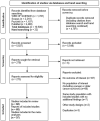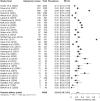Prevalence and risk of psychological distress, anxiety and depression in adolescent and young adult (AYA) cancer survivors: A systematic review and meta-analysis
- PMID: 37559504
- PMCID: PMC10523984
- DOI: 10.1002/cam4.6435
Prevalence and risk of psychological distress, anxiety and depression in adolescent and young adult (AYA) cancer survivors: A systematic review and meta-analysis
Abstract
Background: Adolescent and young adult (AYA) cancer survivors (CS) face unique psychosocial challenges, which may affect their mental health. However, there are inconsistencies in AYA definitions and varying prevalence data on psychological distress, anxiety, and depression. We aimed to synthesize published literature on prevalence, risk, longitudinal changes, and predictors for these outcomes and estimate pooled prevalences.
Methods: We searched for observational studies published in English before June 1 2022, in PubMed, PsycINFO, Scopus, and Web of Science. Two researchers extracted independently information on study characteristics, prevalence, and risk. The pooled prevalence (PP) of psychological distress, anxiety, and depression was estimated using random-effects models. Geographical region, treatment status, and assessment instruments were considered in stratified meta-analyses.
Results: Sixty-eight studies were included in the systematic review and 57 in the meta-analyses. We estimated an overall prevalence of 32% (n = 30; 4226/15,213 AYAs; 95% CI, 23%-42%; I2 = 99%) for psychological distress, 29% for anxiety (n = 24; 2828/8751 AYAs; 95% CI, 23%-36%; I2 = 98%), and 24% (n = 35; 3428/16,638 AYAs; 95% CI, 18%-31%; I2 = 98%) for depression. The range of PP of psychological distress varied across geographical regions, treatment status, and assessment instruments. The PP of anxiety varied significantly across continents, while no variations were seen for depression. Studies found higher risks for psychological distress, anxiety, and depression in AYAs compared to older cancer survivors or cancer-free peers.
Conclusions: Our research found that one in three AYA-CS experience psychological distress or anxiety and one in four are affected by depression, highlighting the need for specialized psychological services for AYA-CS in oncology settings and AYA-focused interventions.
Keywords: AYA cancer survivors; anxiety; depression; psychological distress; systematic review.
© 2023 The Authors. Cancer Medicine published by John Wiley & Sons Ltd.
Conflict of interest statement
The authors declare none.
Figures




Similar articles
-
The long-term impact of cancer: Evaluating psychological distress in adolescent and young adult cancer survivors in Switzerland.Psychooncology. 2019 Mar;28(3):577-585. doi: 10.1002/pon.4981. Epub 2019 Jan 24. Psychooncology. 2019. PMID: 30636177
-
Does age matter? Comparing post-treatment psychosocial outcomes in young adult and older adult cancer survivors with their cancer-free peers.Psychooncology. 2018 May;27(5):1404-1411. doi: 10.1002/pon.4490. Epub 2017 Aug 4. Psychooncology. 2018. PMID: 28672093
-
Prevalence of mental disorders and psychosocial distress in German adolescent and young adult cancer patients (AYA).Psychooncology. 2018 Jul;27(7):1802-1809. doi: 10.1002/pon.4730. Epub 2018 Apr 26. Psychooncology. 2018. PMID: 29644783
-
Measuring Development of Adolescent and Young Adult Cancer Patients: An Integrative Review of Available Instruments.J Adolesc Young Adult Oncol. 2018 Jun;7(3):270-282. doi: 10.1089/jayao.2017.0127. Epub 2018 Feb 9. J Adolesc Young Adult Oncol. 2018. PMID: 29425060 Review.
-
Fear of cancer recurrence in adolescent and young adult cancer survivors: A systematic review of the literature.Psychooncology. 2019 Apr;28(4):675-686. doi: 10.1002/pon.5013. Epub 2019 Feb 17. Psychooncology. 2019. PMID: 30703261
Cited by
-
Anxiety and Depression Trajectories in Young Adults Up to 5 Years After Being Diagnosed With Cancer.Cancer Med. 2025 Mar;14(5):e70715. doi: 10.1002/cam4.70715. Cancer Med. 2025. PMID: 40047054 Free PMC article.
-
Factors Affecting Psychosocial Distress in Adolescents and Young Adults with Cancer: BRIGHTLIGHT Cross-Sectional and Longitudinal Cohort Study Results.Cancers (Basel). 2025 Mar 31;17(7):1196. doi: 10.3390/cancers17071196. Cancers (Basel). 2025. PMID: 40227784 Free PMC article.
-
Physical disability and psychological distress before and after a diagnosis of cancer: evidence on multiple cancer types from a large Australian cohort study, compared to people without a cancer diagnosis.BMC Med. 2025 May 19;23(1):290. doi: 10.1186/s12916-025-04111-0. BMC Med. 2025. PMID: 40389978 Free PMC article.
-
Latent Profile Analysis of Post-Surgical Psychological Distress in Young Thyroid Cancer Patients and Its Association with Self-Management Efficacy.J Multidiscip Healthc. 2025 Jun 10;18:3345-3356. doi: 10.2147/JMDH.S518462. eCollection 2025. J Multidiscip Healthc. 2025. PMID: 40524729 Free PMC article.
-
Peer2Me - evaluation of a peer supported program for adolescent and young adult (AYA) cancer patients: study protocol of a randomised trial using a comprehensive cohort design.BMC Cancer. 2024 Jul 2;24(1):788. doi: 10.1186/s12885-024-12547-5. BMC Cancer. 2024. PMID: 38956510 Free PMC article.
References
-
- Adolescent and Young Adult Oncology Progress Review Group . Closing the gap: research and care imperatives for adolescents and young adults with cancer. NIH pub. No. 06–6067. Bethesda: USA National Cancer Institute, National Institutes of Health, and the LIVESTRONG Young Adult Alliance. 2006.
-
- International Agency for Research on Cancer . Cancer today. GLOBOCAN; 2020. Accessed January 30, 2023. https://gco.iarc.fr/today
-
- Zebrack B, Hamilton R, Smith AW. Psychosocial outcomes and service use among young adults with cancer. Semin Oncol. 2009;36:468‐477. - PubMed
Publication types
MeSH terms
LinkOut - more resources
Full Text Sources
Medical
Miscellaneous

